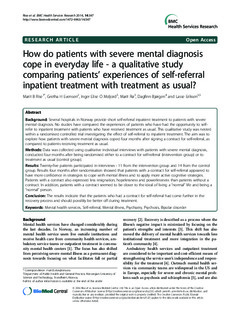| dc.contributor.author | Rise, Marit By | |
| dc.contributor.author | Evensen, Gretha Helen | |
| dc.contributor.author | Moljord, Inger Elise Opheim | |
| dc.contributor.author | Rø, Marit | |
| dc.contributor.author | Bjørgen, Dagfinn | |
| dc.contributor.author | Eriksen, Lasse | |
| dc.date.accessioned | 2015-09-11T11:49:25Z | |
| dc.date.accessioned | 2015-09-17T11:40:12Z | |
| dc.date.available | 2015-09-11T11:49:25Z | |
| dc.date.available | 2015-09-17T11:40:12Z | |
| dc.date.issued | 2014 | |
| dc.identifier.citation | BMC Health Services Research 2014, 14(347) | nb_NO |
| dc.identifier.issn | 1472-6963 | |
| dc.identifier.uri | http://hdl.handle.net/11250/300538 | |
| dc.description.abstract | Background: Several hospitals in Norway provide short self-referral inpatient treatment to patients with severe
mental diagnosis. No studies have compared the experiences of patients who have had the opportunity to selfrefer
to inpatient treatment with patients who have received treatment as usual. This qualitative study was nested
within a randomised controlled trial investigating the effect of self-referral to inpatient treatment. The aim was to
explore how patients with severe mental diagnosis coped four months after signing a contract for self-referral, as
compared to patients receiving treatment as usual.
Methods: Data was collected using qualitative individual interviews with patients with severe mental diagnosis,
conducted four months after being randomised either to a contract for self-referral (intervention group) or to
treatment as usual (control group).
Results: Twenty-five patients participated in interviews - 11 from the intervention group and 14 from the control
group. Results four months after randomisation showed that patients with a contract for self-referral appeared to
have more confidence in strategies to cope with mental illness and to apply more active cognitive strategies.
Patients with a contract also expressed less resignation, hopelessness and powerlessness than patients without a
contract. In addition, patients with a contract seemed to be closer to the ideal of living a “normal” life and being a
“normal” person.
Conclusion: The results indicate that the patients who had a contract for self-referral had come further in the
recovery process and should possibly be better off during treatment.
Keywords: Mental health services, Self-referral, Mental illness, Psychiatry, Psychosis, Bipolar disorder. | nb_NO |
| dc.language.iso | eng | nb_NO |
| dc.publisher | BioMed Central | nb_NO |
| dc.title | How do patients with severe mental diagnosis cope in everyday life - a qualitative study comparing patients' experiences of self-referral inpatient treatment with treatment as usual? | nb_NO |
| dc.type | Journal article | nb_NO |
| dc.type | Peer reviewed | en_GB |
| dc.date.updated | 2015-09-11T11:49:25Z | |
| dc.source.volume | 14 | nb_NO |
| dc.source.journal | BMC Health Services Research | nb_NO |
| dc.source.issue | 347 | nb_NO |
| dc.identifier.doi | 10.1186/1472-6963-14-347 | |
| dc.identifier.cristin | 1148837 | |
| dc.description.localcode | © 2014 Rise et al.; licensee BioMed Central Ltd. This is an Open Access article distributed under the terms of the Creative Commons Attribution License (http://creativecommons.org/licenses/by/2.0), which permits unrestricted use, distribution, and reproduction in any medium, provided the original work is properly credited. The Creative Commons Public Domain Dedication waiver (http://creativecommons.org/publicdomain/zero/1.0/) applies to the data made available in this article, unless otherwise stated. | nb_NO |
